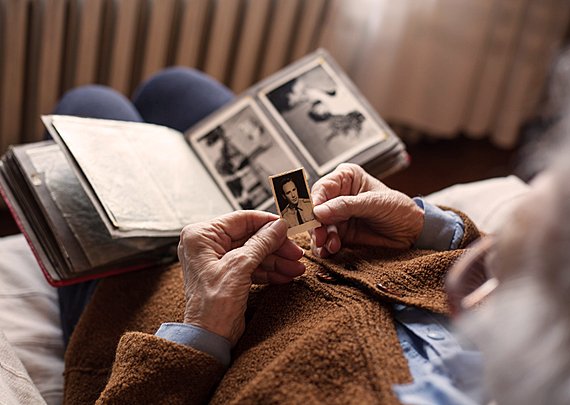Residential Dementia Care
We understand that a person’s experience of dementia is as individual and unique as they are. While a dementia diagnosis can mean a greater need for care, our focus is also on supporting our residents’ emotional wellbeing; helping them to maintain their identity and dignity; and enabling a continued engagement with their family. We do this by offering choice, respect, minimising medicinal intervention, and placing the emphasis on research-led care.
We provide our residents living with dementia with calm, enriching environments, in areas designed specifically for their needs with dedicated social spaces, outside terraces, and sensory gardens. We partner with leading research institutions at the forefront of dementia research to continuously develop our individualised service based on the latest best-practice and innovation.

We promise to honour our residents as unique individuals; to embrace the person they were and the person they are today.
Let's talk about Dementia
The use of negative language, in care settings and wider society, to describe people living with dementia has been widely discussed since Kitwood wrote his 1997 seminal text on dementia[1]. Much has been done in recent years to raise awareness about terms such as ‘challenging behaviour’, and use instead positive language. To ensure that all residents living with dementia are treated in a way that ensures their dignity, KYN commissioned Innovations in Dementia (iD) to collaborate with people living with dementia to create a comprehensive good practice guide on the words and images that are acceptable when talking about and writing about people living with dementia. These good practice guidelines are a vital resource for professionals working in the field of dementia care as well as for family and friends. We believe that encouraging inclusivity and understand begins with the language we use. By collaborating with people living with dementia, we are taking an essential step toward ensuring that our communication is respectful and supportive. We are committed to making a positive impact in the lives of those living with dementia. Lets keep the conversation going and make a difference together.
[1] Kitwood, T. (1997) Dementia Reconsidered: The Person First, Jessica Kingsley Press, London.
Innovations in Dementia (iD) is a not-for-profit Community Interest Company (CIC). People with dementia are at the heart and start of all our work. We support them to live with hope and keep control of their lives. (http://www.innovationsindementia.org.uk/) Innovations in Dementia (iD) also facilitate DEEP, the UK Network of Dementia Voices (https://www.dementiavoices.org.uk/), which comprises around 80 involvement and peer support groups.
FAQs
-
What are the signs of dementia?
The most common signs of dementia are memory loss, difficulty communicating and changes in mood or behaviour. Less common symptoms include delusions, hallucinations and problems with spatial awareness. However, the symptoms and their severity will vary from person to person. If you believe that you or a loved one may be living with dementia, consult your GP for advice.
-
What type of care is needed for people living with dementia?
People living with dementia may require specialised care in order to manage their symptoms and improve their quality of life. The type of care required will depend on the individual, but may include physical, occupational and speech therapy, as well as support with social and recreational activities. Care homes for people living with dementia will encourage activities of this kind and provide personalised care according to each residents’ needs. At KYN, we prioritise maintaining residents’ independence, dignity and wellbeing while living with dementia.
-
When should people living with dementia move into a care home?
There is no one definitive answer to this question, as it will depend on the individual’s needs and circumstances. However, many experts recommend that people living with dementia should start receiving specialist care as soon as their condition begins to deteriorate. If you’re finding it increasingly difficult to care at home for someone living with dementia, this may be a sign that it’s time to start looking into residential or nursing care.
-
Should people living with dementia be cared for at home?
There is no one answer to this question, as each case is different. In some cases, people living with dementia may be able to live at home with support from family and friends. However, as the condition progresses, they may need specialist care which is more easily provided in a care home setting. It is important to discuss all options with a GP or other healthcare professional: this will help ensure they receive the right level of support.
-
How do KYN improve quality of life in dementia care?
Our focus at KYN is on supporting our residents' emotional and physical wellbeing. For our residents living with dementia, we aim to help maintain their identity and independence by offering choice and respect. Our homes feature dedicated areas designed specifically for the needs of people living with dementia both inside and outside, including sensory gardens. We also place an emphasis on family, encouraging relatives and friends to visit and join in with meals and activities. We have on-site nurses and trained staff with expertise specifically in dementia care.


